Add New Wechat Id:IndiansInChina

India’s Parliament has approved a citizenship bill that grants citizenship to minorities facing persecution from three neighbouring countries. A day after clearing the lower house, the Citizenship Amendment Bill was passed on Wednesday by the upper house, with 125 members voting in its favour and 105 against it.
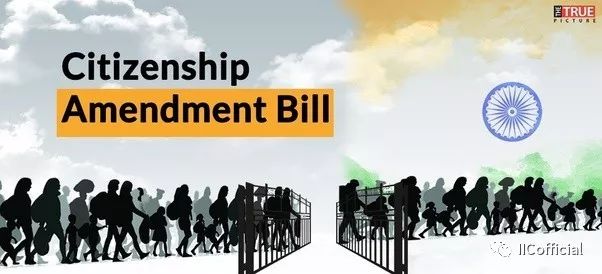
印度国会通过了一项公民权法案,向面临来自三个邻国迫害的少数民族授予公民资格。清理下议院的第二天,上议院周三通过了《公民身份修正法案》,有125名议员投票赞成,有105名议员反对。

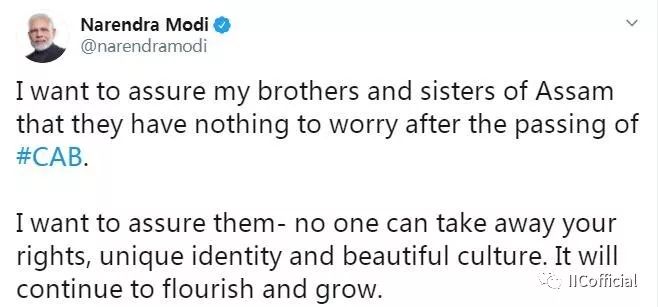

莫迪发推文:印度和我们国家的同情心和兄弟情谊精神具有里程碑意义。很高兴上议院通过了《公民身份修正案》。感谢所有投票赞成该法案的成员。
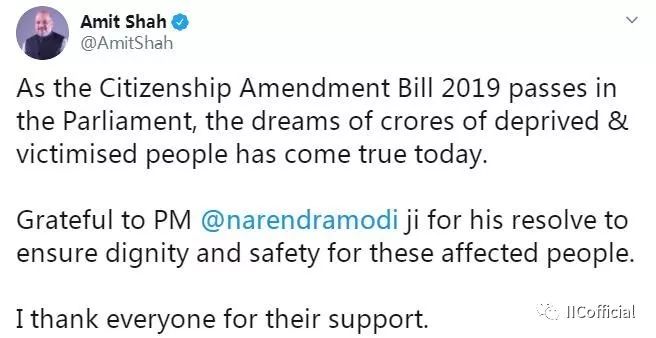
印度内政大臣在推特上写道:随着《 2019年公民修订法案》在议会中的通过,今天成千上万被剥夺和受害的人们的梦想成真。感谢总理莫迪决心为这些受影响的人确保尊严和安全。我感谢大家的支持。
The bill brings sweeping changes to India’s 64-year-old citizenship law by giving citizenship to “persecuted” minorities – Hindus, Sikhs, Buddhists, Jains, Parsis and Christians – from Bangladesh, Afghanistan and Pakistan. But critics say the legislation put forward by the Modi government undermines the country’s secular constitution.
该法案通过赋予孟加拉国,阿富汗和巴基斯坦的“迫害”少数民族-印度教徒,锡克教徒,佛教徒,耆那教徒,帕西斯派和基督教徒-以公民身份,从而对印度已有64年历史的公民法进行了彻底的修改。但批评人士说,莫迪政府提出的立法破坏了该国的世俗宪法。
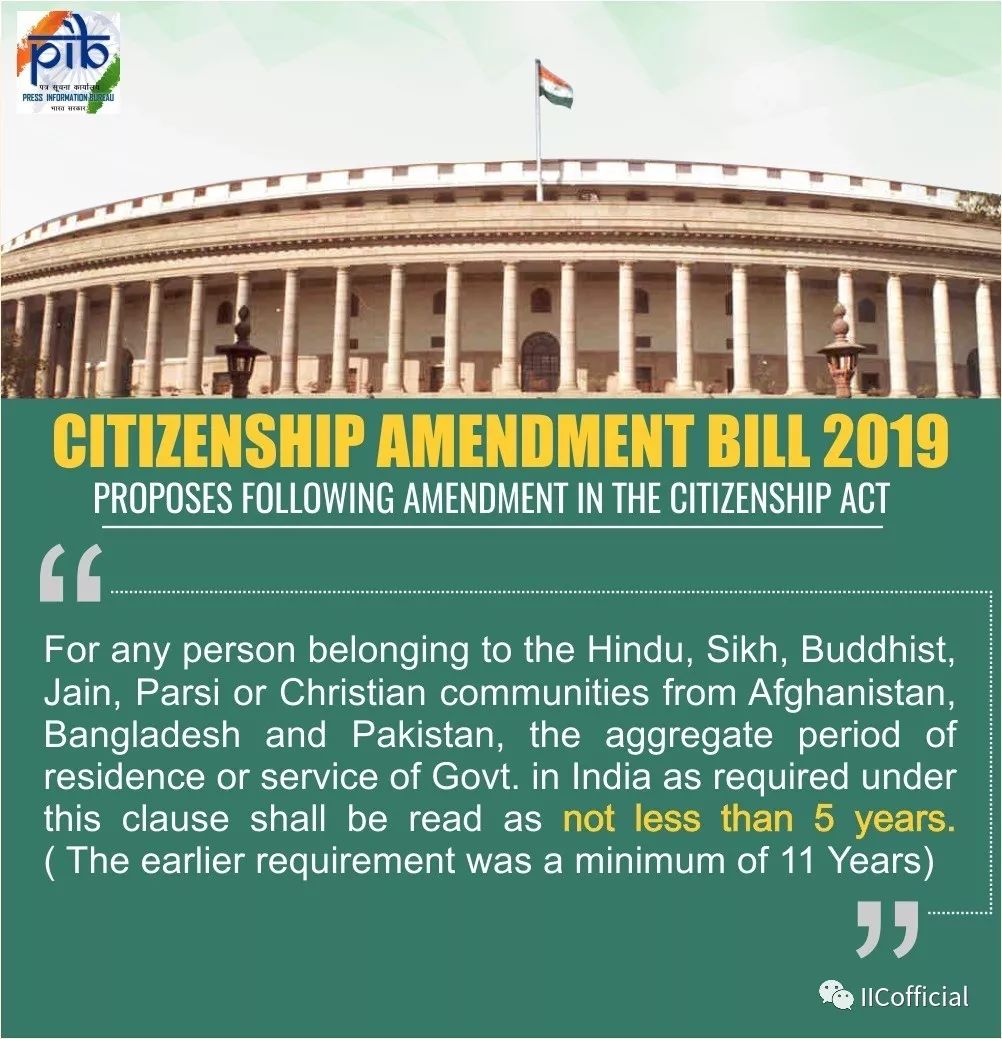
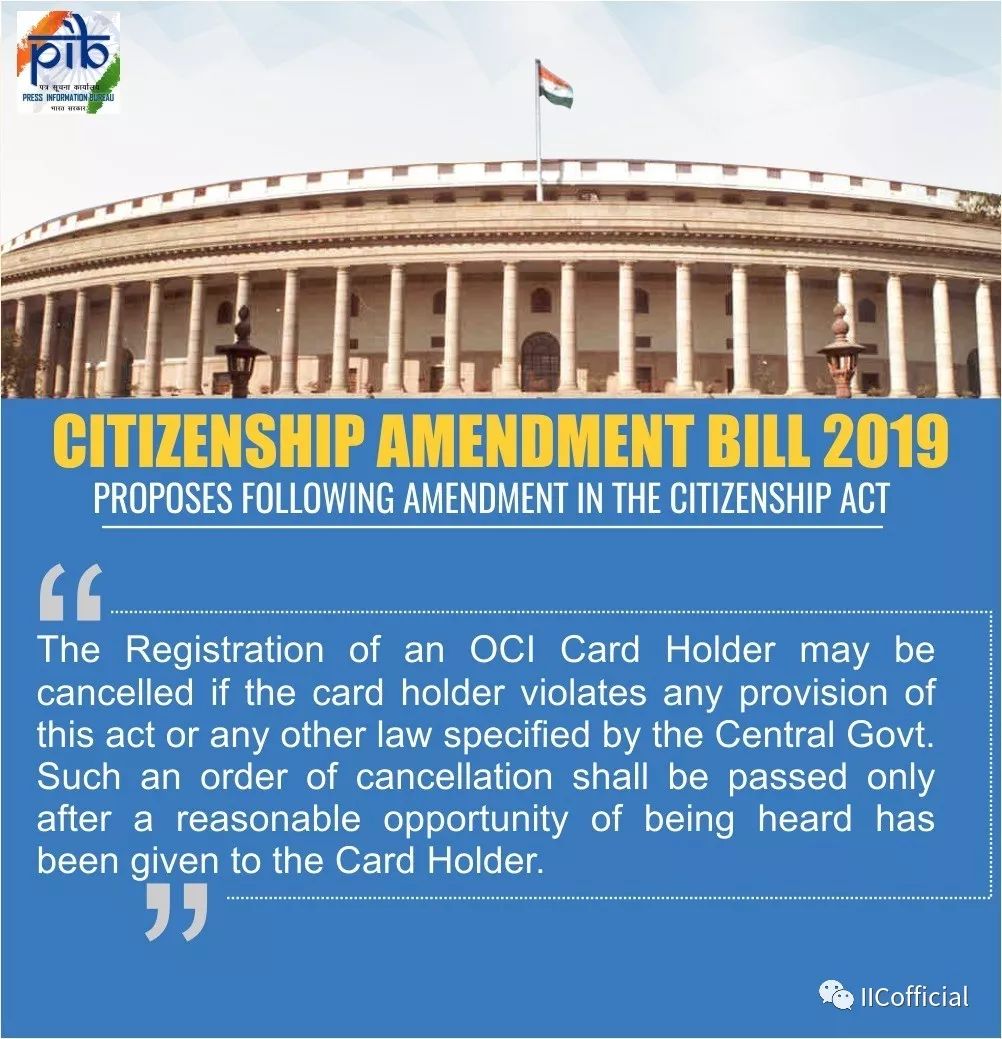
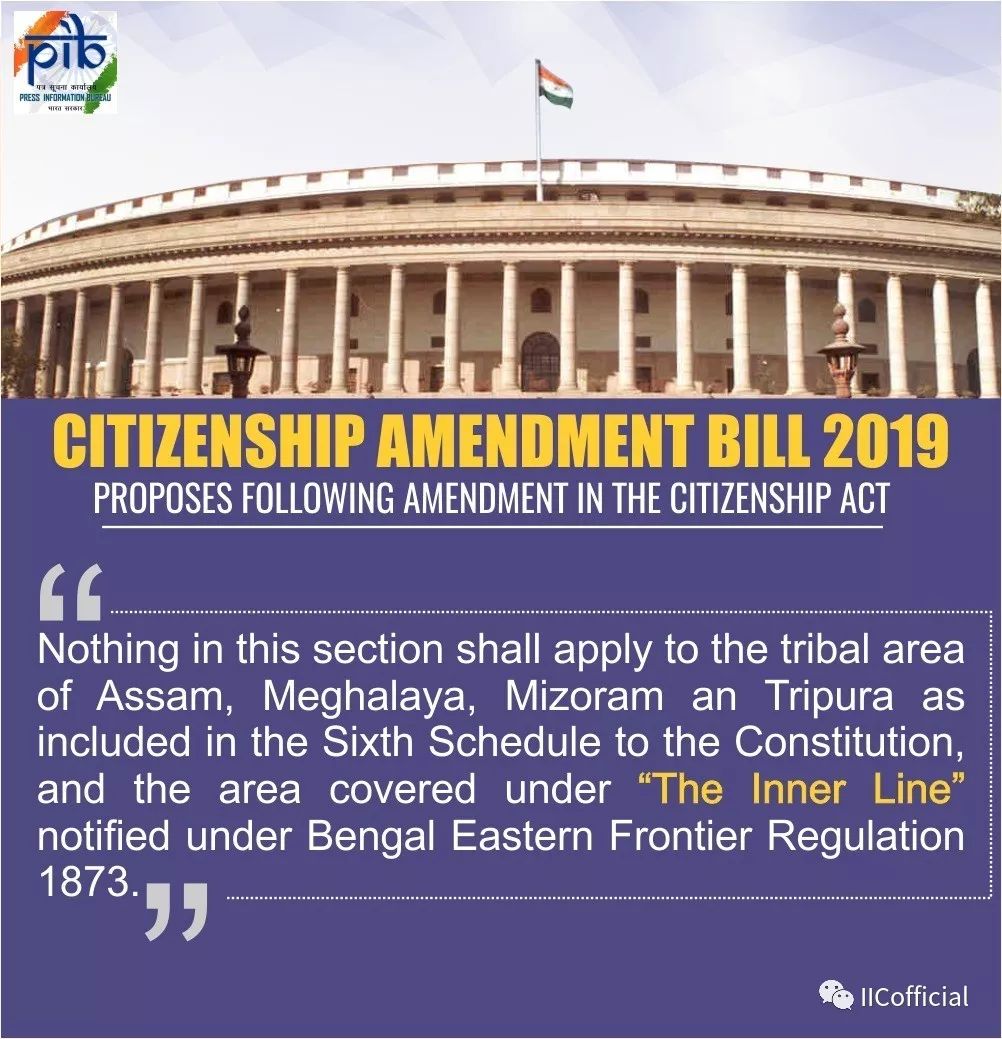

What the bill proposes?
法案提出了什么?
The Citizenship Amendment Bill, 2019 passed by Lok Sabha on Monday and Rajya Sabha on Wednesday, proposes to accord citizenship to illegal Hindu, Sikh, Buddhist, Jains, Parsis and Christian migrants from Pakistan, Bangladesh and Afghanistan.The bill also relaxes the provisions for “Citizenship by naturalisation”. The proposed law reduces duration of residency from existing 11 years to just five years for people belonging to the same six religions and three countries.
印度周一在下议院和周三在上议院通过的《 2019年公民修订法案》提议赋予来自巴基斯坦,孟加拉国和阿富汗的非法印度教徒,锡克教徒,佛教徒,耆那教徒,帕西斯派和基督教徒移民以公民身份。自然,这意味着从这些国家/地区以外的任何群体或社区中识别自己身份的移民将没有资格获得公民身份。该法案还放宽了“归化国籍”的规定。拟议的法律将属于相同六个宗教和三个国家的人的居住期限从现有的11年减少到仅五年。
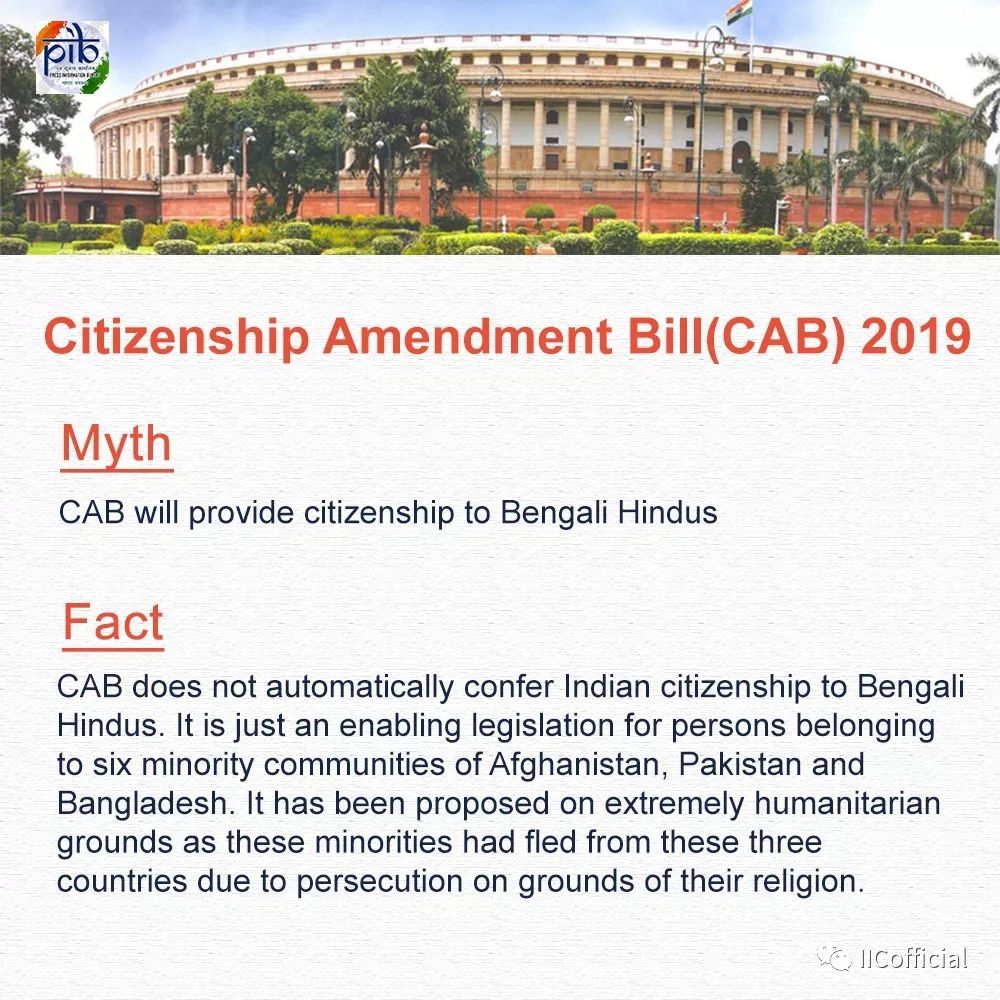
In a series of tweets posted through the Press Bureau of India, , the government tried to clear the air by busting what it calls “myth” about the Bill.
Who all does it cover?
它涵盖了谁?
The Bill covers six communities namely Hindu, Sikh, Buddhists, Jains, Parsis and Christian migrants from Pakistan, Bangladesh and Afghanistan. As per the Citizenship Act of 1955, an illegal immigrants cannot get citizenship in India. An illegal migrant is defined as people who either entered the country without proper documents, or stayed on beyond the permitted time. In 2015, the government made changes to the passport and foreigner’s acts to allow non-Muslim refugees from these countries to stay back in India even if they entered the country without valid papers.
该法案涵盖了六个社区,即印度教徒,锡克教徒,佛教徒,耆那教徒,帕西斯派和来自巴基斯坦,孟加拉国和阿富汗的基督教移民。根据1955年的《公民法》,非法移民无法在印度获得国籍。非法移民的定义是没有适当证件进入该国或在允许时间内停留的人。2015年,政府对护照和外国人的行为进行了修改,以允许来自这些国家的非穆斯林难民即使没有有效证件入境也可以留在印度。
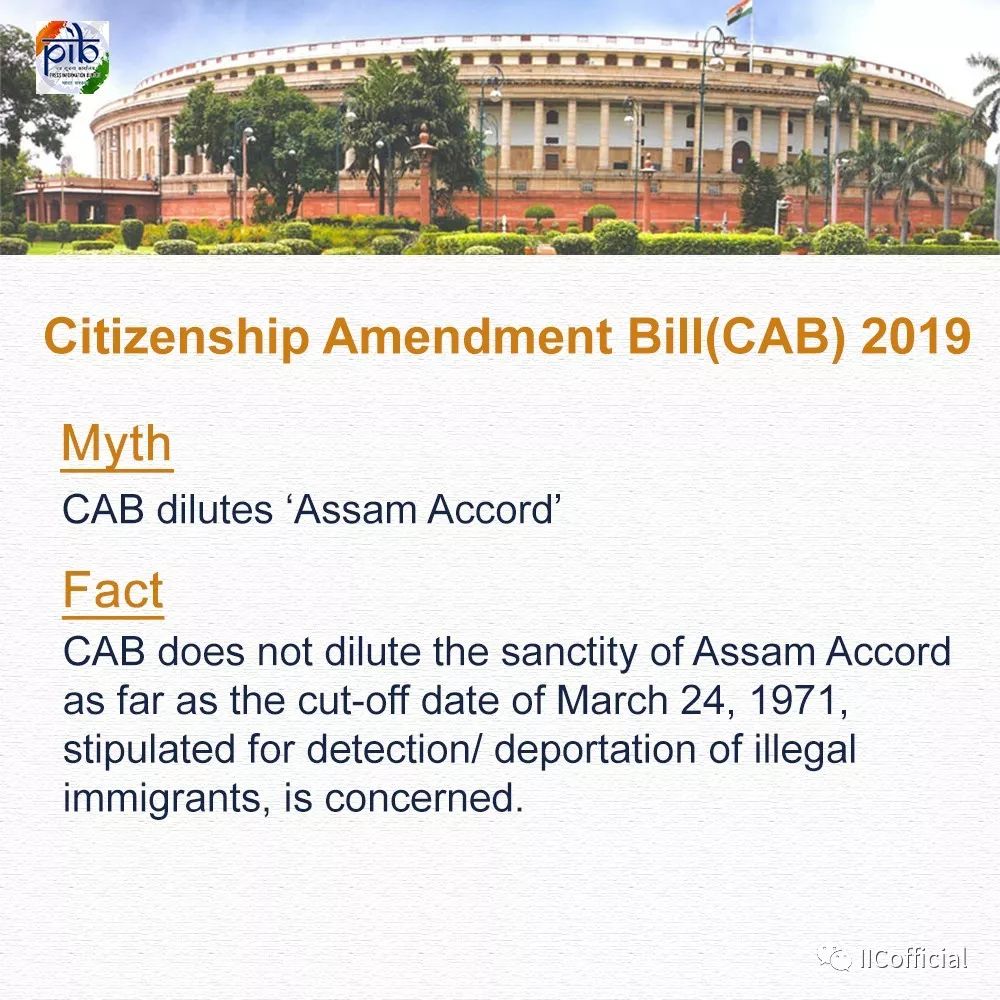
In a series of tweets posted through the Press Bureau of India, , the government tried to clear the air by busting what it calls “myth” about the Bill.
Who does it leave out?
谁遗漏了?
Leading opposition parties say the bill is discriminatory as it singles out Muslims who constitute nearly 15 percent of country’s population. The government clarifies that Pakistan, Afghanistan and Bangaldesh are Islamic republics where Muslims are in majority hence they cannot be treated as persecuted minorities. It also assures that the government will examine the application from any other community on case to case basis.
领先的反对党表示,该法案具有歧视性,因为该法案专门选出了占该国人口近15%的穆斯林。政府澄清说,巴基斯坦,阿富汗和孟加拉国是伊斯兰共和国,穆斯林占多数,因此不能将其视为受迫害的少数民族。它还确保政府将视情况对其他社区的申请进行审查。
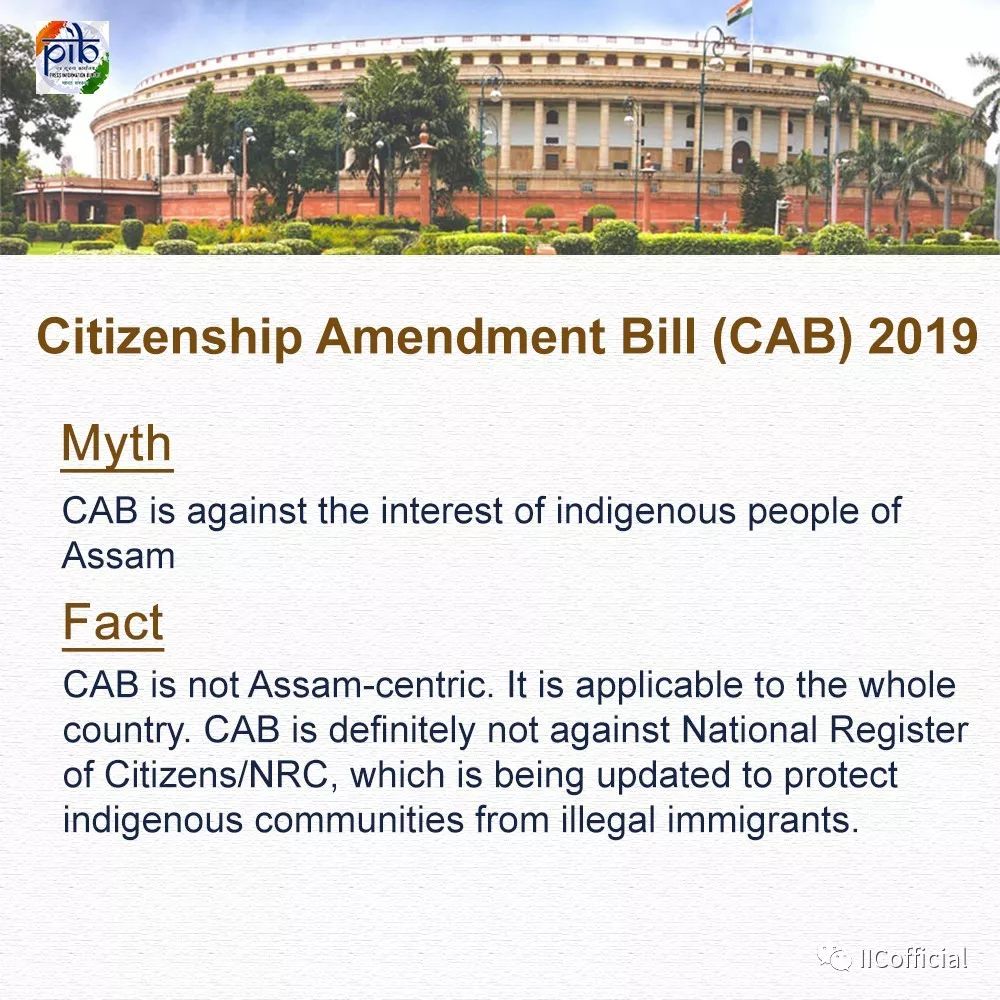
In a series of tweets posted through the Press Bureau of India, , the government tried to clear the air by busting what it calls “myth” about the Bill.
What is the govt’s logic on this?
印度政府对此有何逻辑?
Citing partition between India and Pakistan on religious lines in 1947, the NDA government has argued that millions of citizens of undivided India belonging to various faiths were staying in Pakistan and Bangladesh from 1947. “The constitutions of Pakistan, Afghanistan and Bangladesh provide for a specific state religion. As a result, many persons belonging to Hindu, Sikh, Buddhist, Jain, Parsi and Christian communities have faced persecution on grounds of religion in those countries. Some of them also have fears about such persecution in their day-to-day life where right to practice, profess and propagate their religion has been obstructed and restricted. Many such persons have fled to India to seek shelter and continued to stay in India even if their travel documents have expired or they have incomplete or no documents,” the Bill states.
莫迪政府援引印度和巴基斯坦在1947年的宗教路线上进行划分,认为自1947年以来,数百万属于各种信仰的未分割印度公民一直居住在巴基斯坦和孟加拉国。“巴基斯坦,阿富汗和孟加拉国的宪法规定了 结果,在这些国家,许多印度教,锡克教徒,佛教徒,si那教徒,帕尔西族和基督教徒的人们因宗教信仰而遭受迫害,其中一些人在日常生活中也担心受到这种迫害。生活,宗教信仰和传播权的生活受到阻碍和限制。许多这样的人逃到印度寻求庇护,即使他们的旅行证件已过期,证件不完整或没有证件,也继续留在印度。” 比尔说。
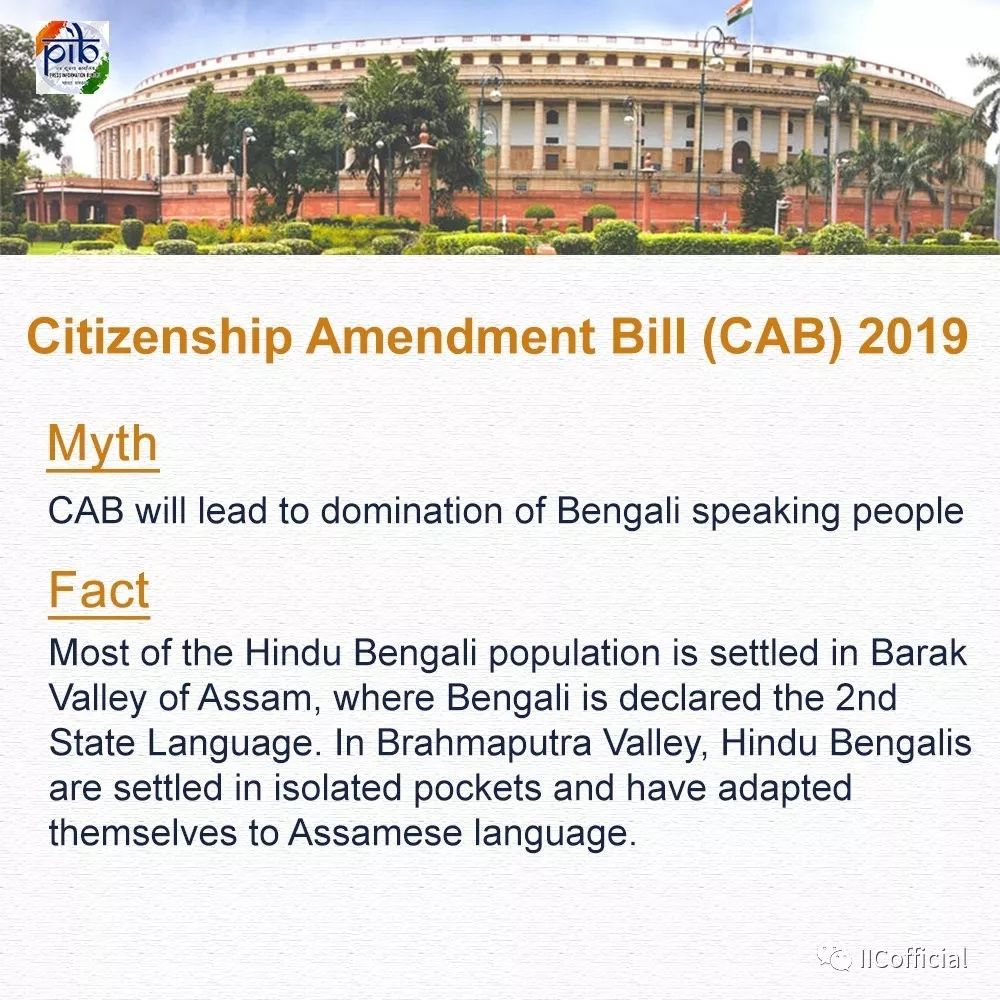
In a series of tweets posted through the Press Bureau of India, , the government tried to clear the air by busting what it calls “myth” about the Bill.
What is the background of the bill?
法案的背景是什么?
It was one of the poll promises of the NDA government. The Bill in its earlier form was passed in January 2019, ahead of the general elections. It again sought to grant Indian citizenship to the six non-Muslim communities-Hindu, Buddhist, Christian, Parsi, Jain and Sikh. It reduced the mandatory requirement of 12 years stay in India to seven years to be eligible for citizenship if they do not possess any document. The earlier Bill was referred to Joint parliamentary Committee, however the Bill lapsed as it could not be taken up in Rajya Sabha.
这是莫迪政府的民意测验之一。较早形式的该法案于大选之前于2019年1月获得通过。它再次寻求将印度国籍赋予六个非穆斯林社区:印度,佛教,基督教,帕西,Ja那教和锡克教。如果他们没有任何文件,就可以将在印度居留12年的强制性要求降低为7年,以便有资格获得公民身份。较早的法案已提交联合议会委员会审议,但由于未能在印度上议院接受而被废止。
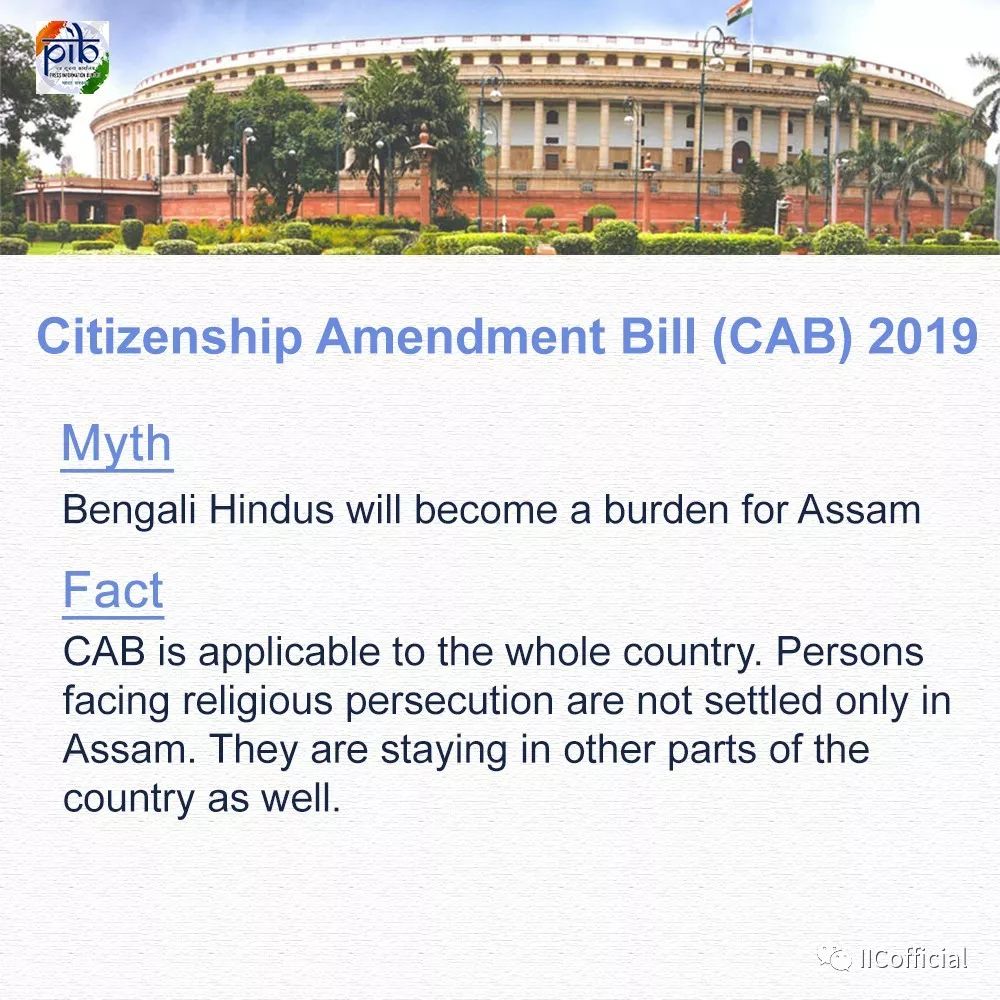
In a series of tweets posted through the Press Bureau of India, , the government tried to clear the air by busting what it calls “myth” about the Bill.
Who are the opposers?
谁是反对者?
Among the main opposition against the Bill is that it is said to be violative of Article 14 of the India’s Constitution — the Right to Equality. Congress and a few other Indian political parties have been steadfastly opposing the bill, claiming that citizenship can’t be given on the basis of religion.
对该法案的主要反对意见之一是,该法案违反了印度《宪法》第14条-平等权。国会和其他一些印度政党一直坚决反对该法案,声称不能基于宗教信仰获得公民身份。
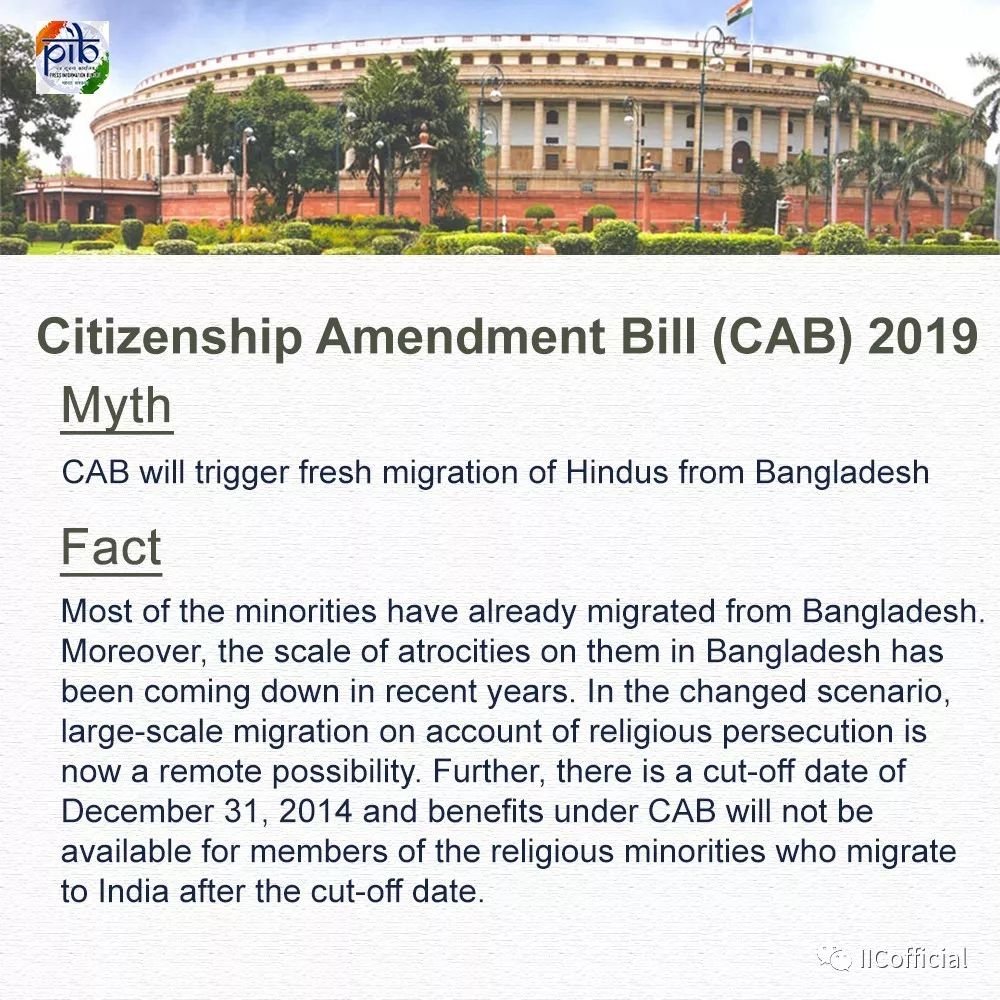
In a series of tweets posted through the Press Bureau of India, , the government tried to clear the air by busting what it calls “myth” about the Bill.
What are the objections that have come up?
提出了哪些反对意见?
Many feel that permanent settlement of illegal immigrants will disturb the region’s demography and further burden resources and decrease employment opportunities for indigenous people.
许多人认为,永久定居非法移民将打扰该地区的人口,进一步加重资源负担,并减少土著人民的就业机会。
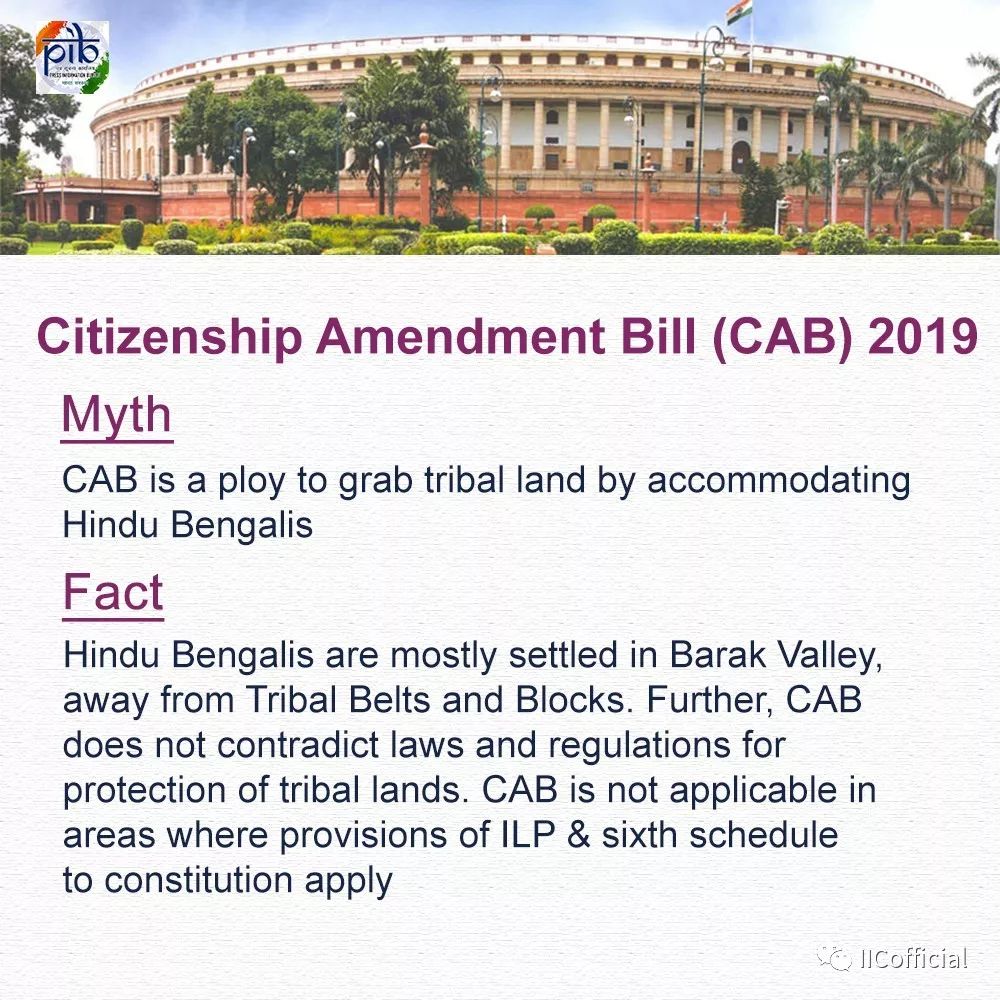
In a series of tweets posted through the Press Bureau of India, , the government tried to clear the air by busting what it calls “myth” about the Bill.
How many will it add to India’s population?
它会增加多少印度人口?
There are no official figures other than records furnished by the Intelligence Bureau before the JPC saying there are 31,313 persons belonging to these minority community living in India on Long Term Visa. They had sought refuge here on grounds of religious persecution. Home Minister Amit Shah in Parliament said the bill will give a new dawn to lakhs and crores of people. Parties like Shiv Sena have been asking for an exact number. As per the IB records the numbers are – Hindus 25,447, Sikhs 5,807, Christians 55, Buddhists 2 and Parsis 2.
联合议会承诺之前,除了情报局提供的记录外,没有其他官方数字,其中有31,313人属于这些少数民族社区,他们通过长期签证居住在印度。他们在这里以宗教迫害为由寻求庇护。印度内政部长阿米特·沙阿在国会上表示,该法案将使数百万人崭露头角。根据国际文凭组织的记录,数字是-印度教徒25,447,锡克教徒5,807,基督徒55,佛教徒2和帕西斯2。
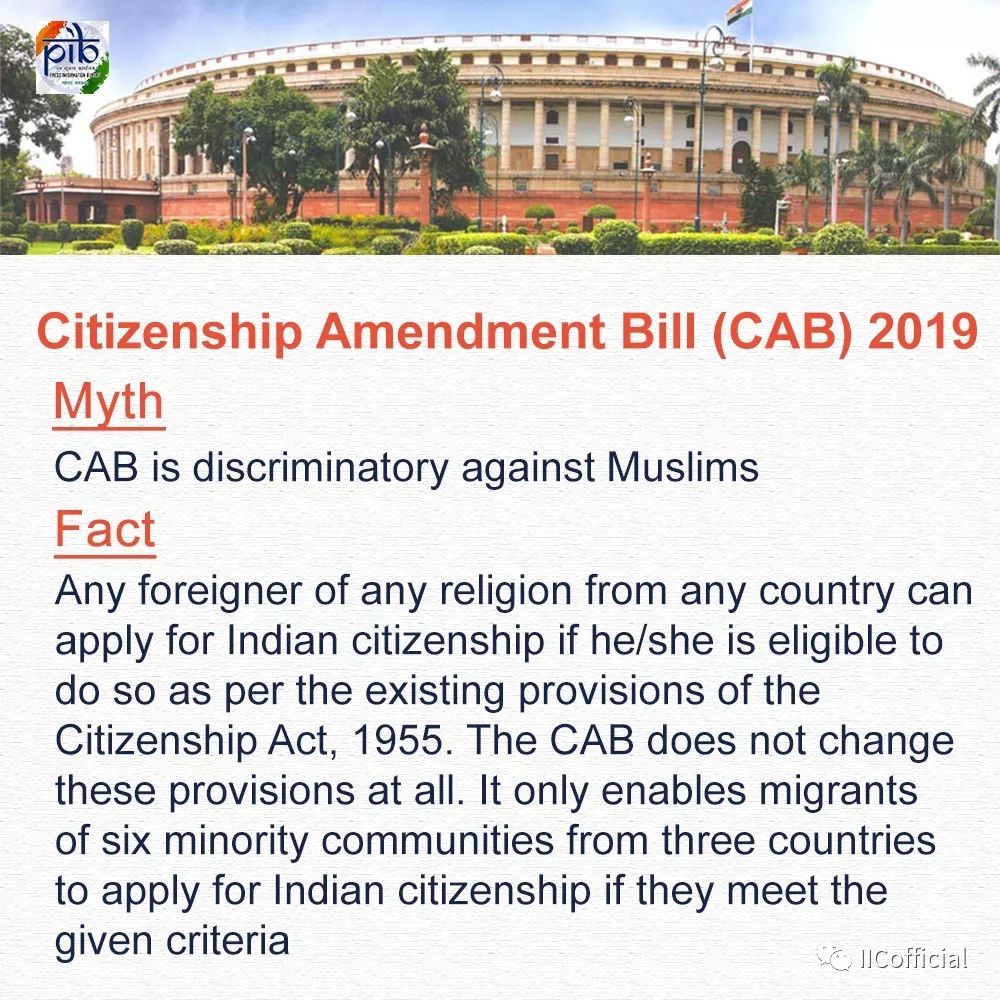
In a series of tweets posted through the Press Bureau of India, , the government tried to clear the air by busting what it calls “myth” about the Bill.
The Indian Citizenship Amendment Bill (CAB) that was passed by the Parliament on 11th December, has stirred great controversy across the nation. It has been hot topic on social media in India. Several senior oppositionleaders have indicated that they may move to India’s Supreme Court against the Citizenship Bill. The Citizenship (Amendment) Bill will now go to the India’s President for his assent.
议会于12月11日通过的《印度国籍修正案》(CAB)在全国引起了巨大争议。 这一直是印度社交媒体上的热门话题。 国会几位高级领导人表示,该党可能会违反《公民权法案》而向印度最高法院起诉。 现在,《国籍(修订)条例草案》将获得印度总统的同意。



Please note that we hope more people get the first-hand information, for articles that we have the footnote of the sources on the bottom,IICofficialdoes not necessarily endorse the views presented in this article. The copyright belongs to the original writer, and we’ve tried the best to proofread the content.
Source: Twitter, economictimes.indiatimes.com
If your work in china helps our Indian Community in anyways or can be inspirational to others for good, please write to us atinfo@indiansinchina.com. We would love to post and publish about your work.
ADVERTISEMENT

IndiansinChina.com
Please Scan & Add Official Wechat id of Indians in China to connect with other fellow Indians living in China thru wechat groups. (HaveSpecial Groups for Female only, Business Group, Cultural Exchange , Foodies,Yoga Group, Helping Madad Group, Indian Students Group, FMGE, Dental Students, Mandarin Learning, Music & Medical Assistance / Advice from Indian Doctors )
Scan Above QR Code to Join Indian Wechat Groups

限 时 特 惠: 本站每日持续更新海量各大内部创业教程,一年会员只需98元,全站资源免费下载 点击查看详情
站 长 微 信: lzxmw777






